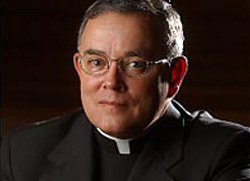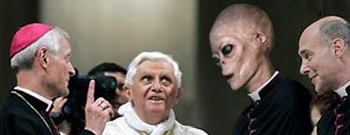Last week at the pope’s retreat house at Castelgandolfo,
The Holy Father attended a screening “Under the Roman Sky,” a film on Pius XII.
Yes the pope watches movies!
Tag: culture
Catholicism from a Jewish viewpoint
Having another perspective is always helpful. Excerpts of an article written by non-Catholic Sam
Miller – a prominent Cleveland Jewish businessman: “Why
would newspapers carry on a vendetta on one of the most important institutions
that we have today in the United States, namely the Catholic Church?
Do
you know – the Catholic Church educates 2.6 million students everyday at the
cost to that Church of 10 billion dollars, and a savings on the other hand to
the American taxpayer of 18 billion dollars. The graduates go on to graduate
studies at the rate of 92%.
The Church has 230 colleges and universities in
the U.S. with an enrollment of 700,000 students.
The Catholic Church has a
non-profit hospital system of 637 hospitals, which account for hospital treatment
of 1 out of every 5 people – not just Catholics – in the United States
today.
But the press is vindictive and trying to totally denigrate in every way
the Catholic Church in this country. They have blamed the disease of pedophilia
on the Catholic Church, which is as irresponsible as blaming adultery on the
institution of marriage.
Let me give you some figures that Catholics should
know and remember. For example, 12% of the 300 Protestant clergy surveyed
admitted to sexual intercourse with a parishioner; 38% acknowledged other
inappropriate sexual contact in a study by the United Methodist Church,
41.8% of clergy women reported unwanted sexual behavior; 17% of laywomen have
been sexually harassed.
Meanwhile, 1.7% of the Catholic clergy has been found
guilty of pedophilia. 10% of the Protestant ministers have been found guilty of
pedophilia. This is not a Catholic problem.
A study of American priests showed
that most are happy in the priesthood and find it even better than they had
expected, and that most, if given the choice, would choose to be priests again
in face of all this obnoxious PR the church has been receiving.
The Catholic
Church is bleeding from self-inflicted wounds. The agony that Catholics have
felt and suffered is not necessarily the fault of the Church. You have been
hurt by a small number of wayward priests that have probably been totally
weeded out by now.
Walk with your shoulders high and you head higher. Be a
proud member of the most important non-governmental agency in the United
States. Then remember what Jeremiah said: ‘Stand by the roads, and look and ask
for the ancient paths, where the good way is and walk in it, and find rest for
your souls’. Be proud to speak up for your faith with pride and reverence
and learn what your Church does for all other religions. Be proud that you’re a
Catholic.”
A new pope: sci-fi coverage of papal leadership
In a galaxy far, far away, a new pope takes the reigns… Because you need a good laugh.
Challenging the well-manicured: Archbishop Chaput takes a look at our cultural engagement
Someone who “gets it” is Capuchin Franciscan Archbishop Charles Chaput, archbishop of Denver. Whether it be culture, beauty, healthcare, abortion, immigrant rights, education, politics, preaching, I think the archbishop is a clear thinker and renders a fine and helpful assessment of Christian life and a Christians involvement in the world. Recently, Archbishop Chaput was in Rome to give a talk he titled, “The Prince of This World and the Evangelization of Culture” at the Fifth Symposium Rome: Priests and Laity on Mission. In this address the archbishop addresses questions of culture, beauty, anthropology, faith, evangelization and sin and grace.
What follows is only an excerpt of a longer talk that you can read at the link above. AND I recommend you read the entire text!
In 1929, as the great totalitarian murder-regimes began to rise up in Europe, the philosopher Raissa Maritain wrote a forgotten little essay called “The Prince of This World.” It is worth reading. We need to remember her words today and into the future. With no trace of irony or metaphor, Maritain argued:
“Lucifer has cast the strong though invisible net of illusion upon us. He makes one love the passing moment above eternity, uncertainty above truth. He persuades us that we can only love creatures by making Gods of them. He lulls us to sleep (and he interprets our dreams); he makes us work. Then does the spirit of man brood over stagnant waters. Not the least of the devil’s victories is to have convinced artists and poets that he is their necessary, inevitable collaborator and the guardian of their greatness. Grant him that, and soon you will grant him that Christianity is unpracticable. Thus does he reign in this world.”
If we do not believe in the devil, sooner or later we will not believe in God. We cannot cut Lucifer out of the ecology of salvation. Satan is not God’s equal. He is a created being subject to God and already, by the measure of eternity, defeated. Nonetheless, he is the first author of pride and rebellion, and the great seducer of man. Without him the Incarnation and Redemption do not make sense, and the cross is meaningless. Satan is real. There is no way around this simple truth.
Let me underline that even more strongly. Leszek Kolakowski, the former Marxist philosopher who died just last year, was one of the great minds of the last century. He was never a religious person in the traditional sense. But Kolakowski had few doubts about the reality of the devil. In his essay Short Transcript of a Metaphysical Press Conference Given by the Demon in Warsaw, on 20th December 1963, Kolakowski’s devil indicts all of us who call ourselves “modern” Christians with the following words:
“Where is there a place [in your thinking] for the fallen angel? … Is Satan only a rhetorical figure? . . . Or else, gentlemen, is he a reality, undeniable, recognized by tradition, revealed in the Scriptures, commented upon by the Church for two millennia, tangible and acute? Why do you avoid me, gentlemen? Are you afraid that the skeptics will mock you, that you will be laughed at in satirical late night reviews? Since when is the faith affected by the jeers of heathens and heretics? What road are you taking? If you forsake the foundations of the faith for fear of mockery, where will you end? If the devil falls victim to your fear [of embarrassment] today, God’s turn must inevitably come tomorrow. Gentlemen, you have been ensnared by the idol of modernity, which fears ultimate matters and hides from you their importance. I don’t mention it for my own benefit – it is nothing to me – I am talking about you and for you, forgetting for a moment my own vocation, and even my duty to propagate error.”
We live in an age that imagines itself as post-modern and post-Christian. It is a time defined by noise, urgency, action, utility and a hunger for practical results. But there is nothing really new about any of this. I think St. Paul would find our age rather familiar. For all of the rhetoric about “hope and change” in our politics, our urgencies hide a deep unease about the future; a kind of well-manicured selfishness and despair. The world around us has a hole in its heart, and the emptiness hurts. Only God can fill it. In our baptism, God called each of us in this room today to be his agents in that work. Like St. Paul, we need to be “doers of the word, and not hearers only” (Jas 1:22). We prove what we really believe by our willingness, or our refusal, to act on what we claim to believe.
But when we talk about a theme like today’s topic – “Priests and laity together, changing and challenging the culture” – we need to remember that what we do, proceeds from who we are. Nothing is more dead than faith without works (Jas 2:17); except maybe one thing: works without faith. I do not think Paul had management issues in his head when he preached at the Areopagus. Management and resources are important – but the really essential questions, the questions that determine everything else in our life as Christians, are these: Do I really know God? Do I really love him? Do I seek him out? Do I study his word? Do I listen for his voice? Do I give my heart to him? Do I really believe he’s there?
For more than 30 years, first as a bishop and now as the successor to St. Peter, Benedict XVI has spoken often and very forcefully about the “culture of relativism” that guides today’s developed world, breaks down human community and intimacy, and drains the meaning out of human activity. That culture flows out of the “new Areopagus” John Paul II described in Redemptoris Missio – a culture formed by radically new technologies and methods of communication; a culture with a power that reshapes how we think, what we think about, and how we organize our personal and social lives.
We have an obligation as Catholics to study and understand the world around us. We have a duty not just to penetrate and engage it, but to convert it to Jesus Christ. That work belongs to all of us equally: clergy, laity and religious. We are missionaries. That is our primary vocation; it is hardwired into our identity as Christians. God calls each of us to different forms of service in his Church. But we are all equal in baptism. And we all share the same mission of bringing the Gospel to the world, and bringing the world to the Gospel.
What a difference a Motu Proprio makes
… sing to the tune of “What a difference a day makes“
What a difference a Motu Proprio makes
Twenty-four little hours
Brought the sun and the flowers
Where there used to be rain
My yesterday was blue, dear
Today I’m part of you, dear
My lonely nights are through, dear
Since you said you were mine
What a difference a Motu Proprio makes
There’s a rainbow before me
Skies above can’t be stormy
Since that moment of bliss, that thrilling kiss
It’s heaven when you find Latin on your menu
What a difference a Motu Proprio makes
And the difference is you
What a difference a Motu Proprio makes
There’s a rainbow before me
Skies above can’t be stormy
Since that moment of bliss, that thrilling kiss
It’s heaven when you find Latin on your menu
What a difference a Motu Proprio makes
And the difference is you
Thanks to
Harlem Boys Choir died
The New York Times reports today that famed and decorated Harlem Boys Choir died. Founded by Dr. Walter Turnball in 1968, the choir had a pretty good run by singing for presidents, foreign and domestic and for Pope John Paul II. Dr. Turnbull died in 2007 and with so did the choir but apparently few people knew this fact outside a select group. Read the obit.
The Church and aliens, ETs, that is
Every so often something interesting happens in the brutish lives we live. Tuesday night
was one of those times, at a seminary no less, that we had an interesting conversation about something many of us knew nothing about: stars, aliens and the connection with faith. We had a visit from Jesuit
Father David Brown whose work is at the Vatican’s Observatory. Funny that David and I are classmates but our journeys took us in different directions. Of course, he went up…that is, he studies the stars and I just went…
As a
coinky-dinky, Stephen Colbert chatted with the Vatican astronomer, Jesuit
Brother Guy Consolmagno, about extraterrestrial life. Who would have thought
that the seminary and Mr. Colbert were doing the same stuff: thinking about life beyond
the present moment.
Watch the interview here…
9 Lessons & Carols: St. Catherine of Siena Church NYC on December 12
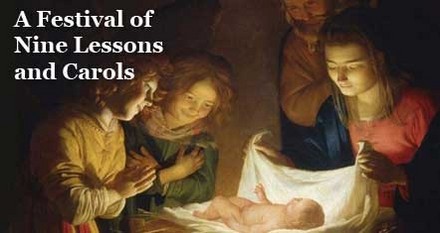 Join the Dominican Friars of Saint Catherine of Siena Church
Join the Dominican Friars of Saint Catherine of Siena Church
& Priory for a Candlelight Lessons and Carols, featuring the Master Singers
of Archmere Academy and the Choir of the Church of the Holy Child Jesus. David
J. Ikfovits will conduct the choirs. The organist will be Father Jordan
Kelly, O.P.
at the Church of Saint Catherine of Siena (411 East 68th Street, New York
City). The favor of your reply is requested on or before December 7.
Please call 212-988-8300, or email
your reply.
Flannery O’Connor: the only great Christian writer in the US
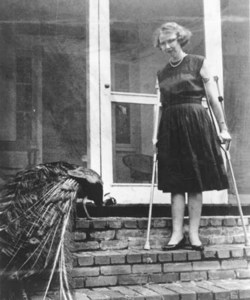 Encountering the grace through the literature is a sufficient way of knowing Christ and the fruitfulness of the Gospel. For many, myself included, Mary Flannery O’Connor is wonderful entree into the Mystery of God. Watch the story, I think you’d surprised by what you’d learn.
Encountering the grace through the literature is a sufficient way of knowing Christ and the fruitfulness of the Gospel. For many, myself included, Mary Flannery O’Connor is wonderful entree into the Mystery of God. Watch the story, I think you’d surprised by what you’d learn.
The Black Nobility and the Pope
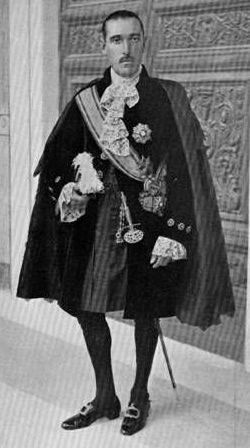 Bet you didn’t know the Church had black nobility. Do you know the difference between the white and the black nobility? Not many good Catholics can anymore. AND certainly not many on this side of the pond. For most Americans the idea of nobility is foolish. Especially given our history of rejecting the monarchy. American interest in things monarchical is kept to a quiet interest in Britain’s queen and perhaps to one or two other royal personages of northern Europe. And if you watch 60 Minutes you’d be familiar with the Sultan in Bahrain.
Bet you didn’t know the Church had black nobility. Do you know the difference between the white and the black nobility? Not many good Catholics can anymore. AND certainly not many on this side of the pond. For most Americans the idea of nobility is foolish. Especially given our history of rejecting the monarchy. American interest in things monarchical is kept to a quiet interest in Britain’s queen and perhaps to one or two other royal personages of northern Europe. And if you watch 60 Minutes you’d be familiar with the Sultan in Bahrain.
